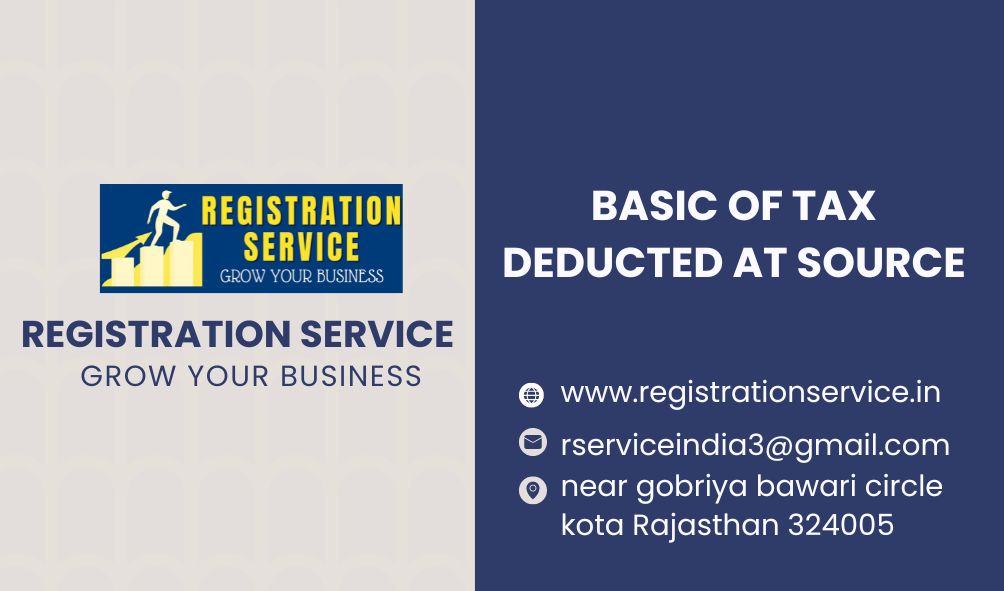Demystifying TDS: A Complete Guide for Businesses in Kota
Tax Deducted at Source (TDS) is a crucial aspect of tax compliance in India. For businesses in Kota, understanding TDS is essential to ensure smooth operations and avoid penalties. This blog, brought to you by Registration Service, your one-stop shop for business registrations and compliance in Kota, will provide a comprehensive guide to TDS.
What is TDS?
TDS is a process where a person (deductor) responsible for making certain payments to another person (deductee) withholds a specific percentage of tax at the source of income before disbursing the remaining amount. This deducted tax amount is then deposited with the government on behalf of the deducted.
Think of it like this: Imagine you’re a freelancer and receive payment for your services. Instead of receiving the entire amount, your client (the deductor) might deduct a portion of it as TDS and deposit it with the government on your behalf.
Who is Involved in TDS?
Deductor: The entity responsible for deducting tax at source. This can be:
–Employers (for salaries)
–Banks (for interest on deposits)
–Government agencies (for payments like rent)
-Companies (for professional fees, rent, etc.)
Deductee: The person whose income is subject to TDS deduction. This can be:
–Salaried individuals
–Business owners
-Investors receiving interest or dividends
Types of Payments Subject to TDS:
TDS applies to a wide range of income sources, including:
-Salaries (except for very low-income earners)
-Interest income from banks and other financial institutions
-Rent payments
-Commission payments
-Professional fees
-Payments for specific services like contractor payments, royalty payments, etc.
Benefits of TDS:
Ensures timely collection of tax revenue: By collecting tax at the source, the government receives a steady inflow of funds throughout the year.
Reduces tax evasion: TDS discourages taxpayers from under-reporting their income.
Simplifies tax filing for deductees: Since a portion of the tax is already deducted at source, the deductee’s tax liability is reduced, potentially simplifying their tax filing process.
TDS Rates:
The applicable TDS rate depends on the type of payment, the deductee’s tax status (individual, company, etc.), and their tax bracket under the chosen tax regime (old or new). It’s best to refer to the latest government tax portal or consult a tax professional for specific rates.
How Does TDS Affect You?
Salaried Individuals:
–Your employer deducts TDS from your salary based on your tax bracket and investment declarations.
-You receive a Form 16 at the end of the financial year, which reflects the TDS deducted on your salary. You can claim credit for this TDS when filing your income tax return.
Freelancers and Business Owners:
–If you receive payments subject to TDS, the deductor will deduct the tax and provide you with a TDS certificate (Form 16A or 16C) mentioning the amount deducted.
-You need to consider this TDS when filing your income tax return.
Important Reminders:
Track your TDS: Maintain records of all TDS certificates you receive.
File your Income Tax Return (ITR): Even if TDS is deducted at source, you are still responsible for filing your ITR.
Claim TDS Credit: Use the TDS certificates to claim credit for the tax already deducted when filing your ITR.
Additional Considerations:
PAN Card: Both deductors and deductees must have a Permanent Account Number (PAN) card for TDS purposes.
Online TDS Filing: The government encourages online filing of TDS returns to streamline the process.
Tax Treaties: TDS provisions may be modified by tax treaties India has with other countries.
Consequences of Non-Compliance:
Failing to deduct or deposit TDS or not filing TDS returns on time can attract penalties and interest charges.
Registration Service: Your Partner in TDS Compliance
Managing TDS deductions and deposits can be complex. Here’s how Registration Service, with its team of experienced CAs, can assist you:
TDS Calculation: Our team will ensure you deduct the correct TDS amount based on the nature of the payment and the deductee’s tax status.
TDS Deposit: We can handle the timely deposit of deducted TDS to the government’s account.
TDS Return Filing: We will take care of filing TDS returns with the Income Tax Department.
Benefits of Using Registration Service for TDS
Accuracy: Avoid errors in TDS calculation and ensure compliance.
Time-Saving: Free yourself from the burden of managing TDS yourself.
Expertise: Leverage the knowledge and experience of our qualified professionals.
Next Steps
For businesses in Kota seeking assistance with TDS compliance, Registration Service is your perfect partner. Contact us today for a consultation and let us help you navigate the world of TDS seamlessly. Remember, timely and accurate TDS filing is crucial to avoid penalties and ensure smooth business operations.
Registration service provides the TDS Return service in the following cities of Rajasthan:
TDS Return in Ajmer
TDS Return in Alwar
TDS Return in Anoopgarh
TDS Return in Balotra
TDS Return in Banswara
TDS Return in Baran
TDS Return in Barmer
TDS Return in Beawar
TDS Return in Bharatpur
TDS Return in Bhilwara
TDS Return in Bikaner
TDS Return in Bundi
TDS Return in Chittorgarh
TDS Return in Churu
TDS Return in Dausa
TDS Return in Deeg
TDS Return in Dholpur
TDS Return in Didwana Kuchaman
TDS Return in Dudu
TDS Return in Dungarpur
TDS Return in Ganganagar
TDS Return in Gangapurcity
TDS Return in Hanumangarh
TDS Return in Jaipur
TDS Return in Jaisalmer
TDS Return in Jalore
TDS Return in Jhalawar
TDS Return in Jhunjhunu
TDS Return in Jodhpur
TDS Return in Karauli
TDS Return in Kekri
TDS Return in Khairthal-Tijara
TDS Return in Kota
TDS Return in Kotputli-Behror
TDS Return in Nagaur
TDS Return in Neem Ka Thana
TDS Return in Pali
TDS Return in Phalodi
TDS Return in Pratapgarh
TDS Return in Rajsamand
TDS Return in Ramganj Mandi
TDS Return in Salumbar
TDS Return in Sanchor
TDS Return in Sawai Madhopur
TDS Return in Shahpura
TDS Return in Sikar
TDS Return in Sirohi
TDS Return in Tonk
TDS Return in Udaipur

